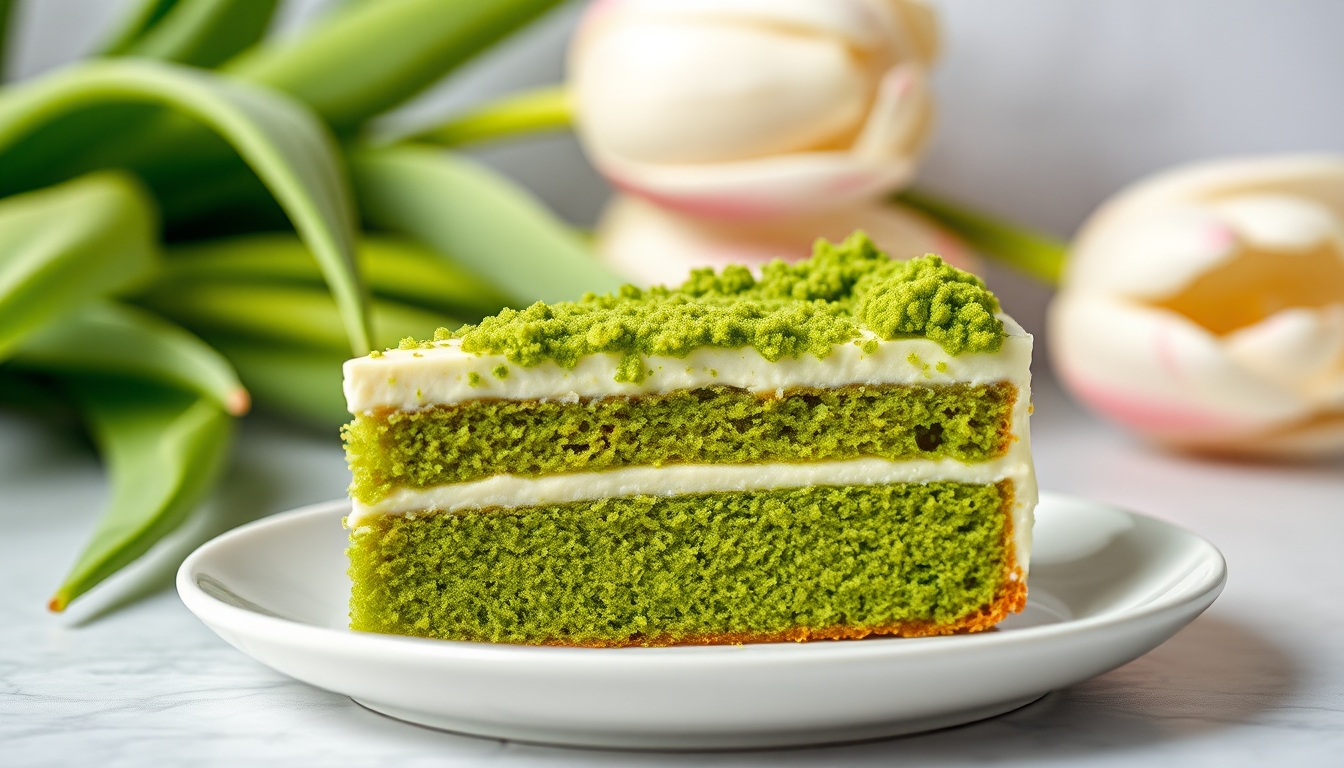Imagine walking into a cozy kitchen, the warmth of the oven filling the air with a subtle aroma of sweetness and earthiness. You catch sight of a beautiful cake that looks as if it belongs in a fairy tale—its vibrant green surface adorned with luscious fruits, resembling a lush mossy forest. This is the magic of the moss cake, a delightful German creation that not only pleases the eyes but also offers a burst of flavor with each bite.
This cake is more than just a dessert; it’s a memory in the making, perfect for family gatherings, birthdays, or simply as a sweet treat to brighten your day. In this article, you’ll discover how to create your very own moss cake, explore its unique history, and learn some expert tips to make it truly special.
What is Moss Cake?
Moss cake, also known as “Moos-Torte” in German, is a whimsical dessert that showcases the beauty of nature through its unique appearance. The cake derives its vibrant green color from fresh spinach, making it not only a feast for the eyes but also a healthier alternative to traditional cakes.
Why It’s Special
- Nutritional Boost: Unlike many cakes, moss cake incorporates fresh spinach, adding a dose of vitamins and minerals.
- Visual Appeal: Its enchanting look can transform any gathering into a memorable event.
- Flavorful Layers: The combination of the fluffy cake and creamy mascarpone frosting creates a delightful contrast that excites the palate.
Ingredients for the Best Moss Cake
Fresh Spinach
Fresh spinach is key for the vibrant green color of the cake. Do not substitute with frozen spinach, as it may release excess water and affect the texture. Fresh spinach is ideal for both color and flavor.
Eggs
Eggs provide structure and moisture to the cake. Fresh large eggs (3) are used in this recipe. If you’re using egg whites only, you’ll need approximately six large egg whites to equal the amount of egg whites required.
All-Purpose Flour
While you can substitute all-purpose flour with gluten-free flour, the texture of the cake will change. All-purpose flour ensures the proper structure and light crumb. If you’re not looking for a gluten-free option, stick with all-purpose flour.
Granulated Sugar
Granulated sugar is essential for providing sweetness and moisture to the cake. I do not recommend substituting with brown sugar as it will change the flavor and texture, and may also alter the color of the cake.
Vegetable Oil
Vegetable oil contributes to the cake’s moisture and enhances its richness. If you prefer, you can substitute vegetable oil with a neutral-flavored oil such as canola or sunflower oil. Avoid using olive oil, as its flavor may interfere with the cake’s taste.
Baking Powder
Baking powder is used to help the cake rise and create a light, fluffy texture. Do not substitute baking powder with baking soda; they are not interchangeable.
Mascarpone Cheese
Mascarpone cheese gives the cake’s cream layer a rich, smooth texture. If mascarpone is unavailable, you can substitute it with cream cheese, but it will slightly alter the taste and consistency.
Heavy Cream
Heavy cream adds lightness and a smooth texture to the cream layer. I do not recommend substituting it with whipped cream or half-and-half, as those will not provide the same creamy texture needed for this cake.
Icing Sugar
Icing sugar sweetens the cream filling and helps achieve a smooth, fluffy texture. If you need to reduce sugar, you can substitute it with a lesser amount of powdered sugar, but keep in mind it might affect the texture of the cream.
Fresh Fruit (for decoration)
Fresh fruits like pomegranate, blueberries, raspberries, and strawberries are perfect for decoration. They add a colorful and vibrant finish to the cake and complement the spinach flavor. Don’t substitute with dried fruits, as they will not have the same fresh, juicy texture needed for the decoration.
How to Make This Moss Cake: Step-by-Step
Creating the perfect moss cake is easier than you might think. Just follow these step-by-step instructions to bring your cake to life!
1. Preheat and Prepare
Start by preheating your oven to 345°F (175°C). While the oven warms up, grease an 8-inch round cake pan with a bit of oil or butter to ensure your cake slides out easily once baked.
2. Spinach Bliss
In a medium pan, cook the fresh spinach over medium heat until it wilts and reduces in size. Once cooked, transfer the spinach to a blender. Add the eggs, flour, sugar, and baking powder to the blender as well. Blend the mixture until it reaches a silky, smooth consistency.
3. Bake the Sponge
Pour the blended mixture into your prepared cake pan. Place it in the preheated oven and bake for approximately forty minutes or until a toothpick inserted into the center comes out clean. Once baked, remove the cake from the oven and let it cool in the pan for about ten minutes before transferring it to a wire rack to cool completely.
4. Cream Creation
While your cake cools, it’s time to prepare the cream. In a mixing bowl, beat the heavy cream until it forms stiff peaks. Then, gently fold in the mascarpone cheese and icing sugar until the mixture is smooth and creamy. If your mascarpone is too cold, you can use a mixer on a low setting to help it combine more easily.
5. Layering Magic
Once your cake is completely cool, carefully slice it into two layers: one thicker and one thinner. Crumble the thinner layer into small pieces to create the “moss” effect.
6. Final Touch
Spread a generous layer of cream over the thicker cake piece, then scatter the crumbled cake pieces on top to mimic moss. Finally, decorate your cake with fresh fruits, placing them artfully around the top for a vibrant finish.
Expert Tips for the Perfect Moss Cake
- Ingredient Substitutions: If you’re looking for a lighter option, you can replace the heavy cream with whipping cream. Just be sure to reduce the amount of sugar by half or omit it altogether if your cream is already sweetened.
- Layering Techniques: Some bakers prefer to create additional layers of cream or use thinner layers of cake. Don’t hesitate to get creative with your layers to make your cake stand out.
- Flavor Enhancements: For an extra layer of flavor, consider adding a teaspoon of lemon zest or vanilla extract to your batter or cream.
How to Store Moss Cake?
Once you’ve created your stunning moss cake, you might wonder how to keep it fresh for future enjoyment.
Short-Term Storage
Store your moss cake in the refrigerator, covered in an airtight container, for up to three days.
Long-Term Storage
If you want to save your cake for a longer period, consider wrapping the unassembled layers separately in plastic wrap and then placing them in an airtight container.
Freezing Instructions
Freezing your moss cake can be a great way to prepare ahead of time. Here’s how to do it:
- Freezing the Cake: Allow the cake layers to cool completely before wrapping them tightly in plastic wrap. Place the wrapped layers in a freezer-safe container.
- Thawing Tips: When you’re ready to enjoy your cake, remove it from the freezer and let it thaw in the refrigerator overnight. Once thawed, layer it with cream and fresh fruits before serving.
FAQs:
How to Make Edible Moss for Cakes?
Creating edible moss can elevate your cake’s presentation. Here’s an Easy method to achieve that:
Ingredients: Combine crushed cookies (like chocolate or graham crackers) with green food coloring and shredded coconut.
Instructions: Mix the ingredients until you achieve a mossy texture. Sprinkle this mixture over your cake for an eye-catching effect.
What are the best fruits to use for decoration?
Fresh berries like blueberries, raspberries, and pomegranate seeds not only add vibrant color but also a refreshing taste that complements the cake.
Can I make this cake gluten-free?
Yes! You can substitute the all-purpose flour with a gluten-free flour blend, ensuring the baking powder is also gluten-free.
What occasions are perfect for serving moss cake?
This cake is ideal for birthdays, family gatherings, and even holiday celebrations. Its unique appearance is sure to impress guests of all ages.
More Cake recipes you will love!
Original red velvet wedding cake recipe
Old fashioned molasses cake recipe

Moss Cake Recipe
Ingredients
For the Sponge Cake:
- 12 oz fresh spinach
- 1 cup granulated sugar
- 1/3 cup vegetable oil
- 2 cups all-purpose flour
- 3 large eggs
- Assorted fruits for decoration
- 2 tbsp baking powder
For the Cream:
- 7 oz heavy cream
- 9 oz mascarpone cheese
- 4 tbsp icing sugar
Instructions
Preheat and Prepare
- Preheat your oven to 345°F (175°C). Grease an 8-inch round cake pan with oil or butter to ensure the cake comes out easily after baking.
Spinach Bliss
- Cook fresh spinach over medium heat until wilted, then blend it with eggs, flour, sugar, and baking powder until smooth.
Bake the Sponge
- Pour the mixture into the prepared pan and bake for about 40 minutes, or until a toothpick comes out clean. Let the cake cool in the pan for 10 minutes before transferring to a wire rack to cool completely.
Cream Creation
- Whip the heavy cream to stiff peaks, then mix in mascarpone and icing sugar until smooth. If the mascarpone is cold, use a mixer to help combine it.
Layering Magic
- Once the cake is cool, slice it into two layers—one thicker, one thinner. Crumble the thinner layer to create the “moss” effect.
Final Touch
- Spread cream on the thicker cake layer, scatter the crumbled cake pieces on top to mimic moss, and decorate with fresh fruits for a vibrant finish.
Send me this recipe!
Just enter your email below and get it sent straight to your inbox!


